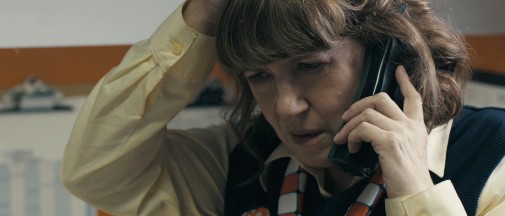
Here, at The Film Experience, there's a lot of love for Ann Dowd. The actress has been celebrated numerous times, interviewed, and she even took over the blog for a day in 2015. With Fran Kranz's Mass in theaters, Dowd may finally be poised to receive her first Oscar nomination after decades doing superb work on stage and on screens of all sizes. For years, despite the consistent quality of her performances, Dowd went unrecognized. In 2012, however, it all changed when Craig Zobel's Compliance generated widespread critical acclaim for the thespian, inspiring her to start a self-funded awards campaign. Making formidable use of this career momentum, Dowd quickly became a recognizable character actress powerhouse and an Emmy winner. Even so, all these years later, Compliance remains one of her greatest achievements…
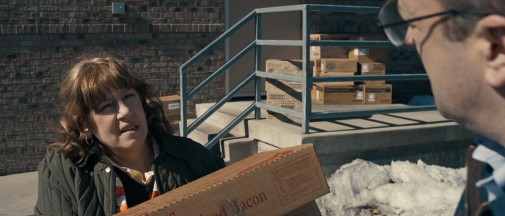
Inspired by a true story that happened at the Mount Washington McDonald's on April 9th, 2004, Compliance dramatizes the horrifying consequences of a prank call and the blind acquiescence to authority with which the caller's demands were met. In the film, the workers of a fictional fast-food restaurant, ChickWich, receive a call from a supposed policeman. Sandra, the manager, takes the phone and handles the situation, following every order given by Officer Daniels. Believing that one of her workers stole from a client, Sandra brings 19-year-old Becky to the office and proceeds to do a strip search. Through several hours, people are convinced to go along, sexually assaulting Becky under the direction of the mysterious cop who never shows up.
Making a movie out of this situation is a tricky proposal, and Zobel's creation doesn't entirely avoid falling into a pit of exploitation. Still, as much as the movie might repulse, Ann Dowd's acting is astonishing. At the very beginning, she illustrates the common humiliations and belittlements of Sandra's everyday life. In the scene, one of the few outside the restaurant, we witness the manager handling an unexpected crisis with their supplier. It's a remarkable introduction to the character, how she thinks and deals with pressure, storing away her discontent and internalizing it. When back at ChickWich, the frustrations of that interaction have simmered down into a performance of professional efficiency.
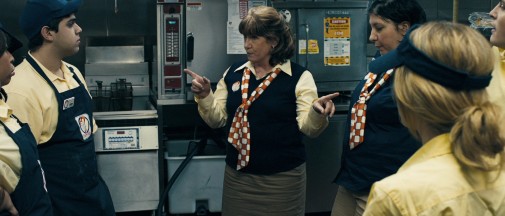
She's tense, myopically focused on getting everything done during this stressful Friday when they're short on bacon and pickles, not to mention that a secret shopper may be on their way. Before everything goes to hell, notice how she lurks around the younger women under her management. One can recognize a note of spite in her watchful gaze. When the opportunity strikes, she's ready to giddily share the news of her upcoming engagement. However, the attention is quickly diluted by gossip about her future victim's youthful sex life. Dowd plays the moment with humanity, a prickle of sadness once an attempt of humor backfires, and she's mocked for it.
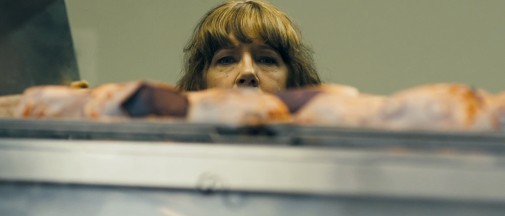
Without emphasizing it too much, the actress reveals how Sandra's a powder keg ready to explode. All that's needed is a spark that sets fire to those resentments, that need to assert competence, value. Right after the inciting incident, Dowd acts as if the phone call is one more headache on a difficult day, but gradually it becomes a case of confirmation bias as Sandra finds a reason to hate and punish Becky. Of course, there's an automatic assumption of guilt too. A few seconds after the phone call, Sandra already says that the younger woman stole something, no doubt registering in her tenor. Indeed, a flash of disdain even flashes over her face when Becky talks back to Officer Daniels.
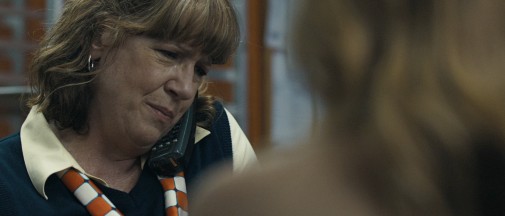
Sandra's little shows of reluctance are so feeble and late-coming that one can't help but wonder if they're genuine. Does Sandra want to avoid Becky's humiliation, or is she merely saving face? Dowd holds the possibilities of truth and falsity, balancing them without letting either one dominate her characterization. Consider how she lets dissonant notes complicate the portrayal of Sandra. She sighs when the 'cop' starts talking about Becky's underwear as if the manager already expected that to happen. Then, there's the reluctance to say obscene things out loud, a tear of self-martyrdom that runs down even as her voice never wavers. It speaks of years of practice, swallowing down real emotion while putting on a front of professionalism for a figure of authority.
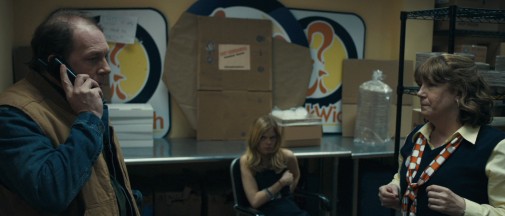
Nevertheless, as soon as the caller mentions drugs, whatever seed of pity might have started to blossom withers away and dies. The transition's a roller-coaster of reactivity that Dowd never overplays, no matter how juicy the material might be. The actress thus navigates the tricky script and seamlessly embodies the point when compliance turns into complicity. I applaud her contention and wish the film around her followed the actress' example. Easing up on the nervous camerawork would have been a good start. In fact, it's a pity that Zobel shoots the movie so artlessly, insisting on claustrophobic closeups and uninterested compositions that do very little to establish how the actors inhabit their space.
That hurts all the performances, but Dowd manages to overcome. The work is there, barely visible in reaction shots and fleeting instants when the camera moves away or her body language is perceptible in closeup. An example is when impatience registers in a nervous shifting of weight from foot to foot. On another occasion, it's remarkable how scattershot Sandra starts to feel as the day bleeds into night, how her attentions are divided, and the slightest movement starts to look belabored. If nothing else, Dowd elicits empathy in how she demonstrates Sandra's exhaustion fueled by panic and the weight of responsibility. Still, it's difficult not to despise the incompetent manager.
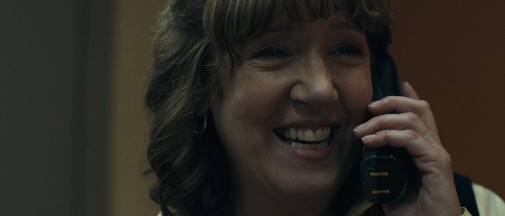
One of the ugliest parts of the characterization is how flattered and susceptible Sandra is to compliments from the caller, his assurances of her good work. Similarly, she appears beyond grateful that someone has reacted to the news of her upcoming engagement with the enthusiasm she believes it deserves. Another scene lacerates not because of a smile but because of indignant rage. Her explosiveness when Becky talks out of line is horrifying, a sudden refusal of all potential mercies. Dowd lets go of any sympathy in that instant, becoming a momentary vision of incandescent ruthlessness with no moral or ethical boundaries. She's more frightening than many horror movie monsters.
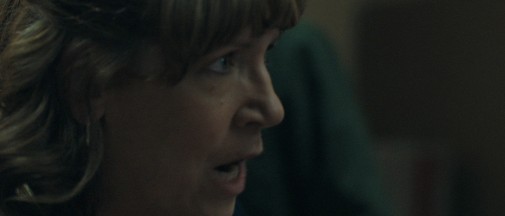
Before the end, it's important to note that the movie makes some changes to the real Sandra's character. For instance, Compliance defines her engagement as a possibility rather than something that's already happened. The movie also avoids showing a moment of remorse on Sandra's part, the weak apology one can see in the actual footage of the event. Instead, the camera remains on Dowd's face, letting her extrapolate whatever regret is there to find, the brutal shame, the tragedy in a silent instant of astonishment. Zobel thus prefers to switch Sandra from stunned muteness to a scene, an unknown amount of time later, where she's interviewed for TV and proceeds to perform a fool's symphony of evasion. It's a marvelous conclusion to the performance that should have been her Oscar clip.
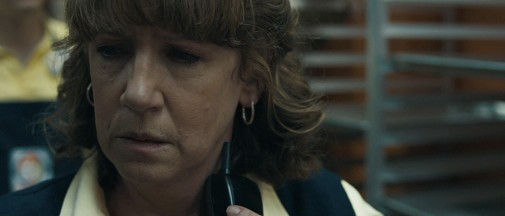
In 2012, Ann Dowd started the awards season as a long shot, but her smart campaigning resulted in a legitimately competitive bid for the Oscar nomination. Among her numerous honors, she received a Critics Choice Award nomination, a Spirit nod, several critics' trophies, and won the National Board of Review prize for Best Supporting Actress. Matters of category fraud aside, it was an inspiring effort, and many would say Dowd's more deserving than some of that year's actual Oscar nominees. The Academy's chosen five were Amy Adams in The Master, Sally Field in Lincoln, Anne Hathaway in Les Misérables, Helen Hunt in The Sessions, and Jacki Weaver in Silver Linings Playbook. The musical star won the little golden man while Weaver was the likely fifth placer, meaning hers would have been the spot Dowd could have taken had she been nominated. Do you believe Ann Dowd was more deserving than her Australian peer?
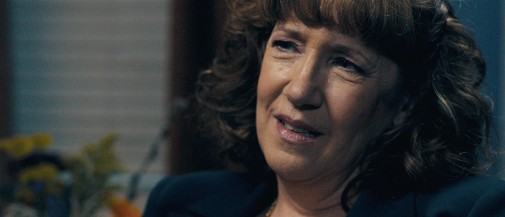
Compliance is streaming on Vudu, Cinemax, DirecTV, and Magnolia Selects. You can also rent it on several platforms.